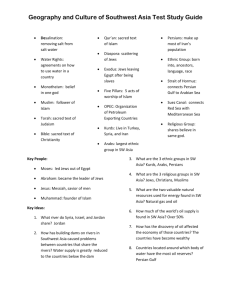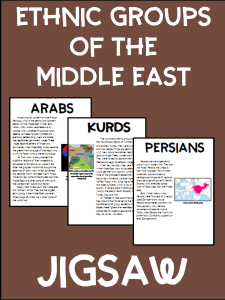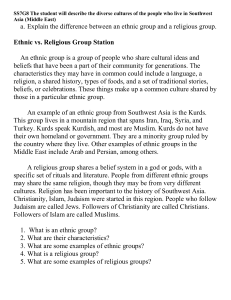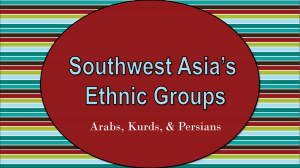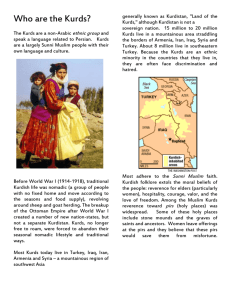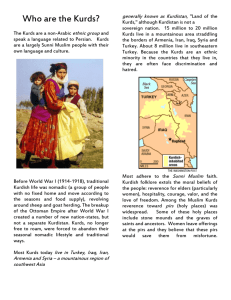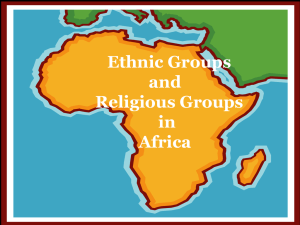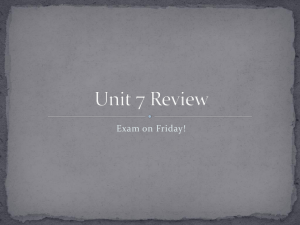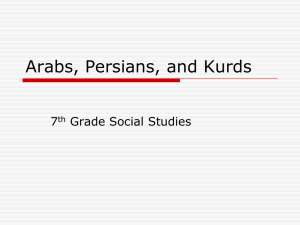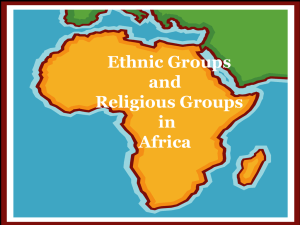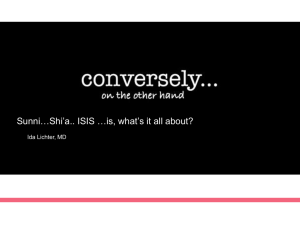Cornell Notes(People of Southwest Asia)
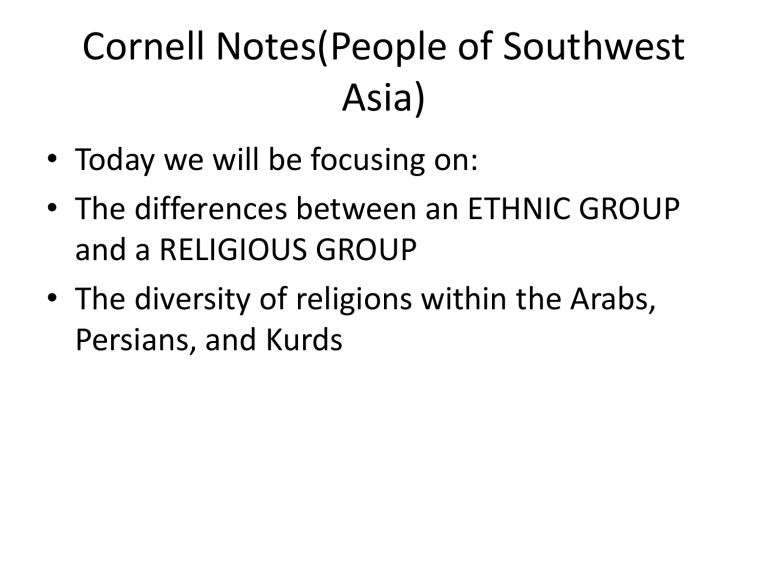
Cornell Notes(People of Southwest
Asia)
• Today we will be focusing on:
• The differences between an ETHNIC GROUP and a RELIGIOUS GROUP
• The diversity of religions within the Arabs,
Persians, and Kurds
ETHNIC GROUP
• Group of people who share cultural ideas and beliefs that have been a part of their community for generations.
• Ex: Language, religion, shared history, types of foods, and a set of traditional stories, beliefs, or celebrations.
• Ex of ethnic group: Kurds
• Live in mountain region that spans Iran, Iraq,
Syria, and Turkey
• Speak Kurdish, and most are Muslim.
ETHNIC GROUP
• Do not have their own homeland or government
• A minority group ruled by the country where they live.
RELIGIOUS GROUP
• Shares a belief system in a god or gods
• Specific set of rituals and literature
• People from different ethnic groups may share the same religion, though they may be from very different cultures.
• Christianity, Islam, and Judaism are examples of religious groups that started in the Middle
East.
Ethnic groups who share same religions
• Arabs of Southwest Asia believe themselves to be descendants of Abraham from the Bible, through his son Ishmael.
• Arabs make up the majority of those who in
Southwest Asia (Middle East)
• Many differences among Arabs
• Most Arabs practice Islam
Diversity of religions
• Muslims are further divided (sects)
– Sunni Muslims
– Shia Muslims
• Many Arabs are Christians
• Most Arabs (Muslim or Christian) speak the
Arabic language
Persians
• Those who live in the modern country of Iran
• Descended from a different group than Arabs and Jews.
• Ancestors were Indo-Europeans, from Central Europe and Southern Russia.
• Country of Persia became known as Iran after WWI.
• Persians, or Iranians, speak Farsi
• Farsi uses the Arabic alphabet but is a different language.
• Practice Islam (most Persians belong to the Shia sect)
• 15 % of Muslims in world are Shia
• 85 % of Muslmis in world are Sunni
Kurds
• Ethnic group that lives in several different countries in
Southwest Asia (Middle East)
• Found in the mountainous areas where Syria, Turkey, Iran, and Iraq come together
• See themselves as a distinct ethnic group from others in the area.
• Speak their own language (Kurdish)
• Have a separate history, literature, music, and traditions.
• Hope to have a nation of their own some day
• This causes conflict with the countries in which they
(Kurdish) people live.
• Most Kurds are Sunni Muslim with a small Shia minority
Check up: Due at the end of the class
• 1. Which do Kurds share as part of their ethnic group?
• A. The Kurdish language
• B. They live in the same country
• C. Self-rule in the land of Kurdistan
• D. The ability to move freely to other countries.
Check up: Due at the end of the class
• 2. Which are the three main religious groups of Southwest Asia (Middle East)
• A. Hinduism, Islam, Judaism
• B. Christianity, Islam, Judaism
• C. Buddhism, Hinduism, Islam
• D. Christianity, Islam, Shamanism
Check up: Due at the end of the class
• 3. Which ethnic group is most numerous in
Southwest Asia (Middle East)
• A. Jews
• B. Kurds
• C. Arabs
• D. Persians
Check up: Due at the end of the class
• 4. What modern country is the home to those who call themselves Persians?
• A. Iran
• B. Iraq
• C. Israel
• D. Syria
Check up: Due at the end of the class
• 5. What is the religion of most Persians?
• A. Christianity
• B. Judaism
• C. Shia Muslim
• D. Sunni Muslim
Check up: Due at the end of the class
• 6. What is the religion of most of the Arabs in
Southwest Asia (Middle East)?
• A. Christianity
• B. Judaism
• C. Shia Muslim
• D. Sunni Muslim
Check up: Due at the end of the class
• 7. What is the religion of most of the Kurds?
• A. Catholicism
• B. Christianity
• C. Shia Muslim
• D. Sunni Muslim
